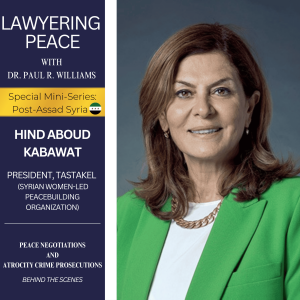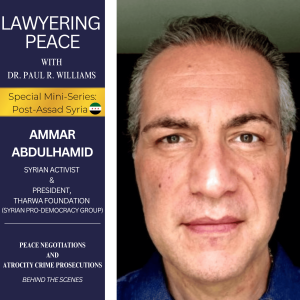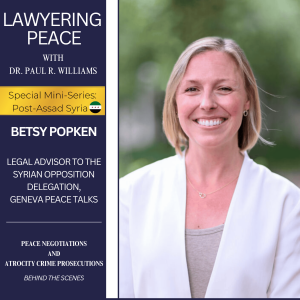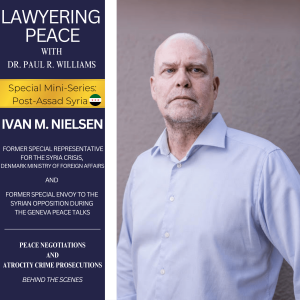Lawyering Peace
Episodes

Tuesday Jan 28, 2025
Hind Kabawat on Opportunities for Women in Post-Assad Syria
Tuesday Jan 28, 2025
Tuesday Jan 28, 2025
In this episode, Hind Kabawat shares her recent experiences returning to Damascus after 14 years, reflecting on a nation scarred by war yet brimming with hope. Hind, a key figure in Syrian peace negotiations and a staunch advocate for women's inclusion, discusses the vital role women play in shaping Syria's future. From leading educational initiatives in refugee camps to advocating for transitional justice, Syrian women are rewriting their narrative as changemakers, not bystanders.
Hind delves into the challenges and opportunities of a future Syrian National Dialogue, highlighting the importance of gender equality, trust-building, and inclusive representation to ensure a sustainable peace. She emphasizes that women must be at the forefront—crafting policy, driving justice, and fostering dialogue—so Syria can achieve lasting stability.
Tune in to hear Hind's powerful insights on how Syrian women are leading the charge for justice, reconstruction, and a brighter future, proving that resilience and hope are unyielding forces in the face of adversity.
This episode is part of our Post-Assad Syria mini-series, where we speak with experts deeply involved in Syria’s peace processes. Together, we’ll reflect on lessons learned, explore the nation’s crossroads, and discuss how to seize this moment of change for a brighter future.
-------------------
Syria has entered a transformative moment. After over a decade of devastating civil war, the Assad regime has been overthrown, marking a seismic shift in the nation's trajectory. While this moment brings immense hope, it also presents profound challenges—rebuilding communities, addressing sectarian divides, and navigating the complexities of international dynamics.
In our latest mini-series, the Lawyering Peace Podcast dives into this pivotal moment for Syria. Through in-depth conversations with experts deeply involved in Syria’s peace processes, we reflect on lessons learned, explore the nation’s crossroads, and discuss what it takes to turn this moment of change into a foundation for lasting peace.

Tuesday Jan 28, 2025
Tuesday Jan 28, 2025
In this episode of the Lawyering Peace podcast’s Post-Assad Syria Mini-Series, Syrian intellectual and activist Ammar Abdulhamid offers an in-depth analysis of Syria’s transitional moment and the challenges ahead. Drawing on decades of advocacy for democratic reform and his experience briefing world leaders, Ammar discusses the current sentiment on the ground, the promise of a resurgent civil society, and the critical role of governance.
He highlights the importance of fostering inclusivity amidst Syria's rich religious and cultural diversity, the necessity for international partners to listen to local voices, and the delicate balancing act facing new leadership. Ammar also outlines the opportunities for the U.S. and its allies to support this transition and examines the lessons Syria can draw from past Arab Spring movements.
Tune in for a nuanced perspective on Syria’s complex political and societal dynamics, the role of civil society, and the international community’s path to meaningful engagement.
--------------------
Syria has entered a transformative moment. After over a decade of devastating civil war, the Assad regime has been overthrown, marking a seismic shift in the nation's trajectory. While this moment brings immense hope, it also presents profound challenges—rebuilding communities, addressing sectarian divides, and navigating the complexities of international dynamics.
In our latest mini-series, the Lawyering Peace Podcast dives into this pivotal moment for Syria. Through in-depth conversations with experts deeply involved in Syria’s peace processes, we reflect on lessons learned, explore the nation’s crossroads, and discuss what it takes to turn this moment of change into a foundation for lasting peace.

Wednesday Jan 22, 2025
Syria’s Path to Transition: Inclusivity, Justice, and the Road Ahead with Betsy Popken
Wednesday Jan 22, 2025
Wednesday Jan 22, 2025
In this episode of our Lawyering Peace Podcast Post-Assad Syria Mini Series, we sit down with Betsy Popken, Chief Legal Advisor to the Syrian Opposition during the Geneva Peace Talks. Betsy shares her unique insights into the challenges and opportunities facing Syria in the wake of the Assad regime, exploring the groundwork laid for transitional justice, governance, and reconciliation.
As Syria grapples with economic hardship, damaged infrastructure, and the formation of an interim government, Betsy evaluates the role of Hay’at Tahrir al-Sham (HTS) in shaping a more inclusive future. While HTS has made promises about incorporating diverse voices—including Alawites, Druze, and women—Betsy emphasizes the need for tangible action to match rhetoric.
From the potential of a national dialogue to create a new constitution to the role of civil society organizations in fostering reconciliation, Betsy discusses how Syrians can build a democracy rooted in collaboration and shared goals. She also cautions against replicating the missteps of past Arab Spring transitions and underscores the importance of learning from those experiences.
Join us for a compelling conversation about the hopes, challenges, and critical decisions shaping Syria’s transition, as well as the lessons the international community and Syrians themselves can draw on to create a more inclusive and just future.
--------------------------
Syria has entered a transformative moment. After over a decade of devastating civil war, the Assad regime has been overthrown, marking a seismic shift in the nation's trajectory. While this moment brings immense hope, it also presents profound challenges—rebuilding communities, addressing sectarian divides, and navigating the complexities of international dynamics.
In our latest mini-series, the Lawyering Peace Podcast dives into this pivotal moment for Syria. Through in-depth conversations with experts deeply involved in Syria’s peace processes, we reflect on lessons learned, explore the nation’s crossroads, and discuss what it takes to turn this moment of change into a foundation for lasting peace.

Monday Jan 20, 2025
Monday Jan 20, 2025
In this insightful episode in our Mini Series on Post-Assad Syria, we welcome Ivan M. Nielsen, a seasoned Danish diplomat and former special representative for the Syria crisis. Drawing on his extensive experience in conflict resolution, human rights, and constitution building, Ivan reflects on lessons from the Geneva peace talks and shares his assessment of Syria’s evolving governance landscape.
From the Assad regime’s divisive tactics to the challenges of engaging with Hay'at Tahrir al-Sham (HTS) under its current terrorism designation, Ivan explores the critical tracks that must be advanced in parallel for a successful Syrian transition: security, service delivery (including education, electricity, healthcare, transportation, and infrastructure), and civic space (politics, governance, and civil society). He underscores the importance of the international community listening to Syrians to understand their needs, avoiding the imposition of rushed timelines for essential governmental transitions, and ensuring external support aligns with Syrian priorities rather than Western-driven agendas.
Tune in for an engaging discussion on the road ahead for Syria, including the obstacles, opportunities, and how hope and unity are shaping the vision for a post-Assad future.-------------------
Syria has entered a transformative moment. After over a decade of devastating civil war, the Assad regime has been overthrown, marking a seismic shift in the nation's trajectory. While this moment brings immense hope, it also presents profound challenges—rebuilding communities, addressing sectarian divides, and navigating the complexities of international dynamics.
In our latest mini-series, the Lawyering Peace Podcast dives into this pivotal moment for Syria. Through in-depth conversations with experts deeply involved in Syria’s peace processes, we reflect on lessons learned, explore the nation’s crossroads, and discuss what it takes to turn this moment of change into a foundation for lasting peace.